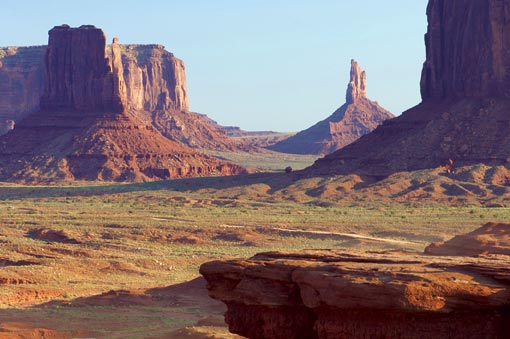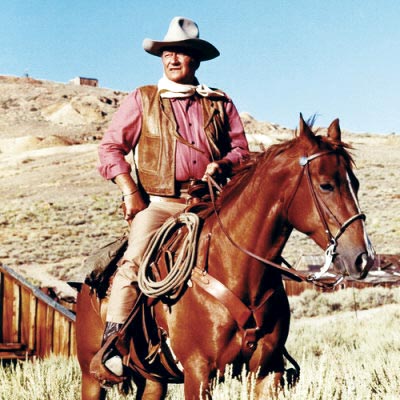
The Duke

In the dimmed light of the movie theatre, patrons have sat entranced for over half a century watching a modern knight give battle in more than 150 Good versus Evil situations.
Whether it was a Western, war film or another scenario, he was the essence of the classic, self-reliant, individualistic hero, but it was the Westerns where he achieved his greatest glory.
He was, of course, the great film star John Wayne.
Critics have called The Searchers the ultimate Western, perhaps the best ever made and the high point of Wayne's acting career. Some of his early films could be called second-rate Westerns but he also left a legacy of classic cinema such as Stagecoach, The Quiet Man, The Alamo, Sands of Iwo Jima and True Grit for which he received his Oscar.
His colleagues had enormous respect for his talents and he touched the emotions of his audience to an unbelievable degree where they were actually 'with him' on the screen.
Often neglected and even panned by movie critics as being only a Western actor, they failed to recognise the depth of Wayne's acting in becoming the character he portrayed and the public, ignoring the critics, idolised the Duke and his films. Not a Method actor, he simply became the character we saw, a true test of acting ability.
From a young Ringo Kid in Stagecoach, an avenging Ethan Edwards in The Searchers, a mature rancher in Red River to an ageing, dying gunfighter in The Shootist, Wayne integrated into his characters so completely that audiences forgot he was playing a role.
Physically, John Wayne was a big man, standing 1.95m (6ft 4ins) tall, about 100 kg with long arms, large hands and a graceful stride. He was also an articulate and thoughtful man with strong political beliefs and a simple code involving both country and professionalism.
 He was born Marion Robert Morrison on 26 May 1907 in the small town of Winterset, Iowa. Parents Clyde and Mary were a hard working, honest and highly religious couple. Clyde was an easygoing man with few business skills while Mary was an aggressive lass which resulted in frequent arguments, a memory which apparently haunted Wayne all of his life.
He was born Marion Robert Morrison on 26 May 1907 in the small town of Winterset, Iowa. Parents Clyde and Mary were a hard working, honest and highly religious couple. Clyde was an easygoing man with few business skills while Mary was an aggressive lass which resulted in frequent arguments, a memory which apparently haunted Wayne all of his life.
At school, the nickname 'Duke' emerged from the family dog by that name and he carried it throughout his life. While a college student, he landed a job at the Fox movie studio as a general prop man which led to full time employment and a minor role in a film directed by John Ford.
In 1938, Ford offered Wayne the plum role of Ringo in Stagecoach, the film that made him a star.
In mid-1964, a medical examination found traces of lung cancer, he had heart surgery in early 1978 and in January 1979 he underwent extensive stomach surgery for renewed cancerous growth. He died on 11 June 1979 at the age of 72.
A measure of his stamina was that he managed to attend the Academy Awards presentation in April 1979 to present the Best Picture award and received a thunderous emotional standing ovation when he appeared on stage. On 26 May, President Carter authorised the minting of a special medal for the Duke, simply stamped: 'John Wayne, American'. Only a few individuals have been honoured by Congress since the first was struck for George Washington.
John Wayne was a mason, a member of the Glendale Demolay Chapter during his high school days. He joined the Craft in July 1970 and although the long and uncertain hours in travel and movie commitments made lodge participation difficult, he still took his membership seriously.
In early 1979 in an interview with TV personality Barbara Walters, which was destined to be his last, when asked about a philosophy that summed up his thinking, he said: 'Listen, I spoke to the man up there on many occasions and I have what I've always had, deep faith that there is a Supreme Being. There has to be, that's just a normal thing to have that kind of faith.'
Article extracted from Freemason magazine, Spring 2012, pages 20-21.


